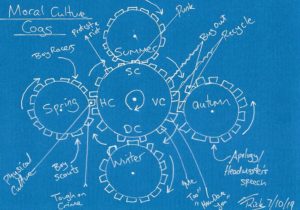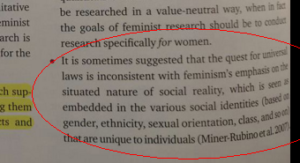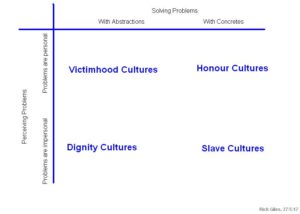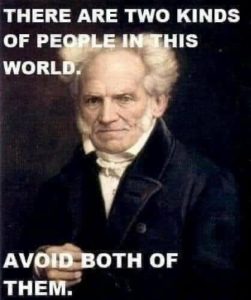Derivation of Moral Cultures
December 11, 2020
By AHNZ
 The Theory of Moral Cultures is a handy framework by which to view humanity. It’s simple yet sophisticated. It’s bounded, yet contains and explains most anyone you’ve ever met or who has ever lived. There are just four Moral Cultures: Dignity Culture, Victimhood Culture, Slave Culture, and Honour Culture. Your personality, dear reader, is as dominant in one of these Cultures in an equivalent way to weather you are left or right-handed. Just as a person’s life charts a pathway through Moral Culture space over the course of their development, so too do the lives of nations.
The Theory of Moral Cultures is a handy framework by which to view humanity. It’s simple yet sophisticated. It’s bounded, yet contains and explains most anyone you’ve ever met or who has ever lived. There are just four Moral Cultures: Dignity Culture, Victimhood Culture, Slave Culture, and Honour Culture. Your personality, dear reader, is as dominant in one of these Cultures in an equivalent way to weather you are left or right-handed. Just as a person’s life charts a pathway through Moral Culture space over the course of their development, so too do the lives of nations.
If you happen to belong to one of these Moral Cultures at the same time as the country you live belongs to it then your life is pretty good. But don’t get complacent! The hegemony of any given Moral Culture over the mainstream tends to last only 5 years. So, the total period of the 4 Moral Cultures turns over every 20 years. There’s more to be said about this but for now, how are these 4 cultures concocted in the first place?
Derivation of Moral Cultures
Only 2 variables define Moral Culture, implying 4 variations: Dignity Culture (DC,) Victimhood Culture (VC,) Slave Culture (SC,) and Honour Culture (HC.) The two variables to think about are, 1. How a person perceives problems, and, 2. How a person solves problems. Let’s look at each in turn.
Perceiving Problems
Humanity is split between two distinct and opposing ways of looking at life’s challenges and obstacles. Most of us have a bit of a mixture but one or the other of these perspectives will be dominant. Either you’re someone who takes problems personally, or you’re someone who does not. To put it the other way, you’re someone who engages with problems via institutions or, not.
Personality Cultures are dedicated to taking everything personally, it’s always about them and reflects on their standing in their social hierarchy. Female hypergamy and male dominance hierarchies – two sides of the same coin, the Personality Culture coin. For example, they are hyper-sensitive to sight and ready to stoop to revenge to make sure their social standing is in credit.
 It follows that, for Personality Cultures, what matters is Feels over Reals. What matters is not the content of an idea but the identity of the person speaking. So Identitarian are they that in order to figure out if something qualifioes as apartheid or colonial or racist they first need to know the identity affiliations of those involved. They care for the personality, not the act. Reality is not Objective but ‘situated in social reality’.
It follows that, for Personality Cultures, what matters is Feels over Reals. What matters is not the content of an idea but the identity of the person speaking. So Identitarian are they that in order to figure out if something qualifioes as apartheid or colonial or racist they first need to know the identity affiliations of those involved. They care for the personality, not the act. Reality is not Objective but ‘situated in social reality’.
“I have always found them of a brave, noble, open and benevolent disposition, but they are a people that will never put up with an insult if they have an opportunity to resent it.”- Captain Cook on Maoris
“A cultural clash between two mindsets that will talk past each other, unable to understand this. And, one is the epistemology of Maori/tribalism/old world/primitive/Feminist world crashing into the other of European/civilisation/modernity. Ironically, these two world views are exactly what The Treaty was an attempt to reconcile.”- The Kiwi Contest to Define ‘Racism’
“Sticks and stones may break my bones but names will never hurt me.”- Ancient Institutional Culture aphorism
 Meanwhile, there’s an entirely different population who deals with the matter of Perceiving Problems impersonally and dispassionately; Institutional Culture. These people in the world you share are concerned about mechanisms, cause and effect relationships, principles, rules, laws, contracts, promises, and evidence. If the extreme Personality Cultist is psychotic, the extreme Institutional Cultist is downright autistic!
Meanwhile, there’s an entirely different population who deals with the matter of Perceiving Problems impersonally and dispassionately; Institutional Culture. These people in the world you share are concerned about mechanisms, cause and effect relationships, principles, rules, laws, contracts, promises, and evidence. If the extreme Personality Cultist is psychotic, the extreme Institutional Cultist is downright autistic!
Naturally, the Institutional Culture folk provide us the best engineers and mathematicians and military generals. On the other hand, it’s the Personality Culture folk who have a competitive advantage when it comes to working with people and ‘reading the room’.
In general, everyone goes around assuming that everyone else looks at problems the same way they do. This is called the Fallacy of Consensus. As such, Personality Culture and Institutional Culture can often clash spectacularly both in societies and in social and romantic relationships. The same fallacy applies to the second variable: How people solve problems.
Solving Problems
 The same points-of-view that inform the identification of a problem apply to solutions methodology too. Some are Abstract thinkers when it comes to solutions, others are Concrete problem-solvers.
The same points-of-view that inform the identification of a problem apply to solutions methodology too. Some are Abstract thinkers when it comes to solutions, others are Concrete problem-solvers.
Concrete Culture folk are very literally minded and have little or no conception for metaphor or analogical reasoning. Reading fiction? A waste of time because it’s all lies, they say! Nothing sophisticated and abstract will be attempted that can be solved by hitting something (or someone) with a hammer.
 An Abstract person wishing to tell everyone some news might employ memorandums and formal processes such as RSVPs and feedback forms. Hopefully, from their point of view, a checklist will be involved in the methodical process of broadcasting. A concrete person will just yell out the news as loudly as they can; Job done.
An Abstract person wishing to tell everyone some news might employ memorandums and formal processes such as RSVPs and feedback forms. Hopefully, from their point of view, a checklist will be involved in the methodical process of broadcasting. A concrete person will just yell out the news as loudly as they can; Job done.
A Concrete will try to solve a problem in the now. If something is broken, they’ll fix it themselves. If there is a conflict they’ll solve it personally on the spot. The Abstract will make calls, form committees, consult lawyers, pass legislation, call the police, whip out a Swiss Army Knife or build a machine or pioneer a new medical procedure.
 Clearly enough, the Concretes are men and women of action. They have simple tastes and short time horizons. They make excellent cowboys and pioneers and soldiers, they are survivors and create the leisure time that affords Abstracts the chance to make their contribution. Laws, transport networks, electricity, engines, philosophy, economics, computing, accountancy, art,…all of these and more are made possible only by Abstract problem solvers.
Clearly enough, the Concretes are men and women of action. They have simple tastes and short time horizons. They make excellent cowboys and pioneers and soldiers, they are survivors and create the leisure time that affords Abstracts the chance to make their contribution. Laws, transport networks, electricity, engines, philosophy, economics, computing, accountancy, art,…all of these and more are made possible only by Abstract problem solvers.
Synthesis
 From here it’s a simple matter of pairing up the two variables into the four arrangements.
From here it’s a simple matter of pairing up the two variables into the four arrangements.
What do you get if you cross an Abstract Problem Solver with someone who takes problems personally? You produce Victimhood Culture.
What is Slave Culture? Someone who blames The System for all their woes and wants it to change so they can be happy and successful. Yet, the only way they can perceive to change anything is by some brute concrete act of force such as vandalism or self-harm. Their means of production might be, for example, to directly annoy and irritate others until they get their needs met second-hand. It’s outside the SC’s scope to believe they could ever change the institutions of society to be ‘equitable’ since, after all, there’s no such word as that in their dictionary.
 Dignity Culture and Victimhood Culture are both Abstract Cultures, both feel at home employing institutions to solve problems which is why they are the very people seen in the roles of our priests, professors, politicians, and public service. The driving distinction between a VC and a DC is that the former takes everything personally and revel in their status. The DC probably just wants the system to serve the people or to do their duty. The VC is able to understand and harness the same institutional power but want to use it to further their own values for a certain identitarian in-group of theirs.
Dignity Culture and Victimhood Culture are both Abstract Cultures, both feel at home employing institutions to solve problems which is why they are the very people seen in the roles of our priests, professors, politicians, and public service. The driving distinction between a VC and a DC is that the former takes everything personally and revel in their status. The DC probably just wants the system to serve the people or to do their duty. The VC is able to understand and harness the same institutional power but want to use it to further their own values for a certain identitarian in-group of theirs.
Honour Culture is like VC in this way too, being both subcultures to Personality Culture. They both see the problems of the world as personal to them but the difference is in what they do about it. A VC will infiltrate the teachers’ college, the humanities department of your workplace. They’ll take a Long March through the Institutions wearing their Chairman Mao Tshirts to get their solution in place. The best an HC can do is form a medium-size gang franchise based around motorcycles, pirate ships, or Viking long-boats.
The VC will say, “Do as I say or you’ll upset me. I’m offended. You’ll hurt me.” The HC will say, “Do as I say or I’ll upset you. I’ll offend you. I’ll hurt you.” The VC is leveraging an abstract idea, a Social Contract, an institutional expectation that we fellow beings are not to hurt one another and not to cry wolf. This will be affective on another Abstract Culture person such as a DC or another VC. The HC doesn’t have access to that capacity and cannot be exploited by it. They’re more honest, if anything, and seek the same ends with direct threats and physical attacks.
So, now that we have these 4 groups we can recognise their influences and their clashings in our world today and in our history. So much about New Zealand’s history or even the people you meet in your life comes into focus when viewed through these 4 archetypes.
 Better yet, it turns out that DC, VC, SC, and HC don’t simply clonk into one another like a lava lamp at all. A pattern forms. There is a 20 year cycle of Moral Cultures, each taking its 5 years or so before yielding to the next in line. New Zealand history, as I seek to prove with Anarchist History of New Zealand, is nothing more than a repeating game of Rock, Paper, Scissors except that there are 4 not 3 competing elements. It is the rivalries, conflicts, and cooperations of these 4 Moral Cultures that write our history. Only by understanding them consciously can we break out of this clockwork determinism and take responsibility for our own future. That is, if we think we can do any better.
Better yet, it turns out that DC, VC, SC, and HC don’t simply clonk into one another like a lava lamp at all. A pattern forms. There is a 20 year cycle of Moral Cultures, each taking its 5 years or so before yielding to the next in line. New Zealand history, as I seek to prove with Anarchist History of New Zealand, is nothing more than a repeating game of Rock, Paper, Scissors except that there are 4 not 3 competing elements. It is the rivalries, conflicts, and cooperations of these 4 Moral Cultures that write our history. Only by understanding them consciously can we break out of this clockwork determinism and take responsibility for our own future. That is, if we think we can do any better.
 Like Comment Share
Like Comment Share






